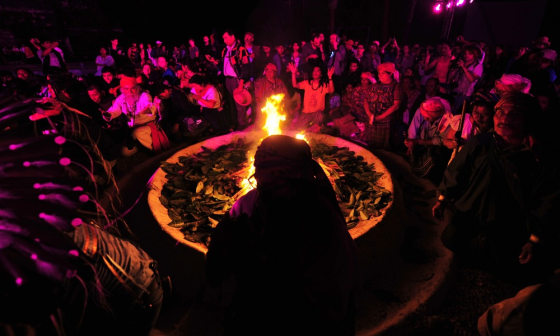The sun has arisen today at Maya monuments in Mexico and Guatemala, heralding the completion of a 144,000-day calendar cycle — but not the end of the world.
Most archaeologists say the ancient Maya regarded sunrise as the signal for the turnover, much as we regard midnight on New Year's Eve as the time to party. And sure enough, tourists as well as modern-day Maya in traditional garb gathered at Chichen Itza's El Castillo pyramid in Mexico to greet the day. Josh Gates, host of the Syfy TV show "Destination Truth," is live-tweeting the activities. (Syfy is owned by NBC Universal, which also owns NBC News Digital.)
The ancient Maya calendar marks Dec. 21 as the end of a cycle known as a baktun, which lasts 144,000 days or nearly 400 years. This finishes up the 13th baktun since Year Zero for the Maya, and taken together, all that time represents an even longer 5,125-year cycle of creation. That led to speculation that the Maya expected the gods to reset the cosmos on Dec. 21. Somehow that speculation was taken seriously enough to whip up this whole end-of-the-world hype.
Along the way, all sorts of claims were made about unseen planets, solar disturbances and other supposed earth changes that would make today a very bad day. But judging from the pictures coming from Chichen Itza and other Maya monuments, people are having a good time today.
In the longer term, Maya community leaders hope all the attention they're getting this week will translate into a wider awareness of their ancient culture and their modern-day challenges. They're not worried about doomsday; they're worried about poverty. Check out this PhotoBlog posting for more about the real concerns being voiced by the indigenous people of Guatemala.
More about 2012:
- Solstice time, and all is well
- The Maya calendar's Big Day dawns
- Why NASA jumped the gun on doomsday
- Doomsday hot spots around the globe
- Video: 'We're very respectful of traditions'
- Cosmic Log archive on 2012 and doomsday fears
Alan Boyle is NBCNews.com's science editor. Connect with the Cosmic Log community by "liking" the log's Facebook page, following @b0yle on Twitter and adding the Cosmic Log page to your Google+ presence. To keep up with Cosmic Log as well as NBCNews.com's other stories about science and space, sign up for the Tech & Science newsletter, delivered to your email in-box every weekday. You can also check out "The Case for Pluto," my book about the controversial dwarf planet and the search for new worlds.
